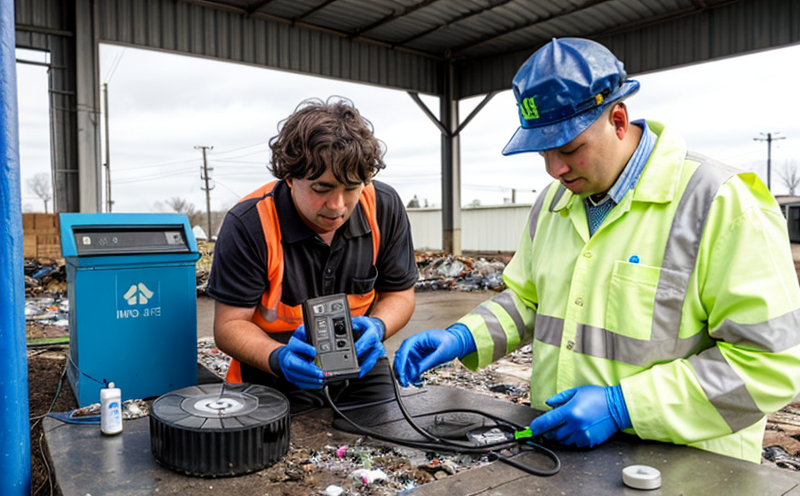JIS C8714 Industrial Battery Recycling Guidelines
The JIS C8714 standard is designed to provide guidelines and specifications for recycling industrial batteries, specifically focusing on the safe handling, processing, and disposal of lead-acid batteries. This Japanese Industrial Standard (JIS) ensures compliance with environmental regulations and promotes sustainable practices in waste management.
Compliance with JIS C8714 is crucial for organizations dealing with electronic waste, especially those involved in battery recycling processes. The standard addresses the entire lifecycle of lead-acid batteries from initial collection through to final disposal or reprocessing. It emphasizes minimizing environmental impact by ensuring that all materials and components are reused rather than discarded.
The testing procedures outlined in JIS C8714 cover various aspects including but not limited to:
- Sampling methods
- Safety precautions during handling
- Methods for separating and recovering lead from batteries
- Processes for neutralizing acids used in battery construction
- Emissions control measures to prevent air pollution
The standard also provides detailed information on how to manage hazardous waste generated during recycling operations. This includes proper storage conditions and transport protocols to ensure that all residues are handled safely.
Why Choose This Test
Selecting JIS C8714 Industrial Battery Recycling Guidelines can offer numerous benefits for businesses operating within the electronic waste sector. Here’s why you should consider this testing service:
- Enhanced Compliance: Ensures full adherence to local and international regulations, thereby protecting your company from potential legal issues.
- Promotes Sustainability: By following these guidelines, companies contribute positively towards environmental conservation efforts by recycling valuable resources sustainably.
- Increased Efficiency: Streamlines operations through structured procedures that reduce waste and improve overall efficiency in the production process.
- Better Reputation: Demonstrating commitment to responsible practices enhances customer trust and loyalty, which is increasingly important as consumers become more environmentally conscious.
Quality and Reliability Assurance
To maintain consistent quality throughout the recycling process, strict adherence to JIS C8714 standards must be maintained. Below are key areas where reliability assurance plays a critical role:
- Sampling Accuracy: Properly collected samples ensure accurate analysis results.
- Handling Protocols: Adhering to prescribed safety measures protects both personnel and equipment from hazards associated with handling hazardous materials.
- Environmental Monitoring: Continuous monitoring ensures that emissions remain within acceptable limits set by regulatory bodies.
Use Cases and Application Examples
| Application Case | Description |
|---|---|
| Battery Manufacturer: | Ensures that their batteries meet the recycling standards specified by JIS C8714, thus ensuring long-term sustainability of their product line. |
| Recycling Facility: | Provides a framework for efficient and safe disposal methods, enhancing operational efficiency while reducing costs associated with environmental fines. |
| Regulatory Bodies: | Helps in enforcing compliance among industry players, fostering a cleaner environment through better waste management practices. |
| Process Stage | Key Activities |
|---|---|
| Collection: | Sorting and categorizing batteries based on type and condition. |
| Processing: | Breaking down batteries into constituent parts for easier recycling. |
| Treatment: | Extracting valuable metals like lead while managing chemical waste responsibly. |





